Arthur Albiston recalls his Liverpool-slaying Manchester United days, part in Ole Gunnar Solskjaer move and that Antti Niemi phonecall
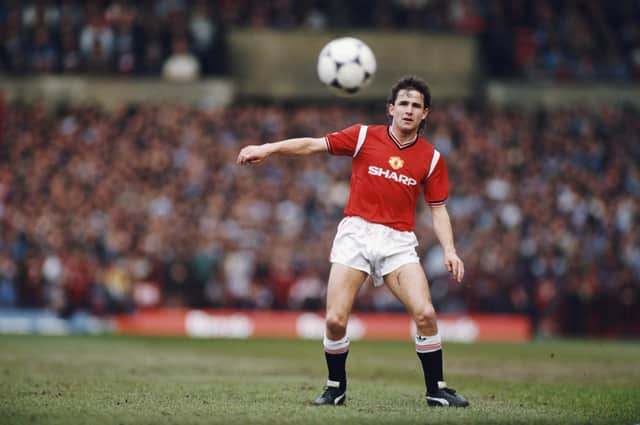

His energetic adventures from left-back seemed to pre-date that position’s evolution by about three decades. It's no wonder he was viewed upon as ultra dependable when his first-ever appearance in an FA Cup tie was stepping in for Stewart Houston in the FA Cup final in 1977. The 19-year-old helped Tommy Docherty’s flamboyant, if flawed, side defeat a treble-chasing Liverpool 2-1.
It’s pleasing to report Albiston, who grew up in Edinburgh, remains as reliable as ever. This weekend's top-of-the-table Premier League clash between the above sides – one trying gamely to maintain their recent dominance, the other seeking to regain it – helped concentrate minds, sending us in the direction of the Altrincham-based Albiston.
Advertisement
Hide AdAdvertisement
Hide AdHis already supreme credentials regarding the subject in hand are boosted as he recalls how one of his only seven goals for the club was a last-minute winner in 1981 against Liverpool at Anfield, where Sunday’s game takes place. He struck after playing a one-two with Frank Stapleton on a typically muddy early 80s pitch. These fixtures were often tasty occasions, as spiky off the pitch as on it.
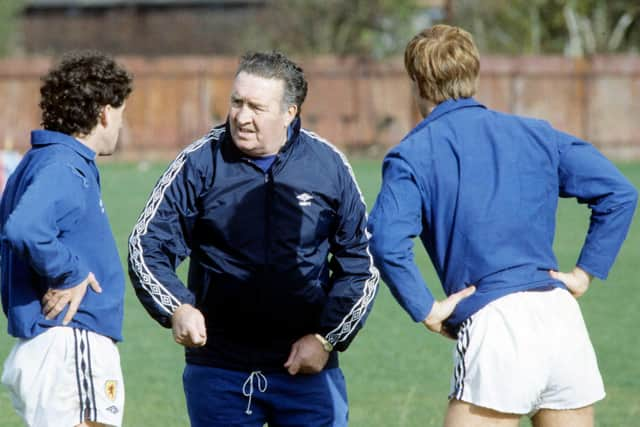

Albiston saw Graeme Souness coming in out of the corner of his eye and expected to be cleaned out but shot anyway, the ball rolling into the corner past Bruce Grobbelaar. “Obviously Manchester United fans bring it up quite a lot,” he says. “You never get tired talking about it.”
This comes up during a near hour-long chat on Thursday night. After a quick call to establish Albiston's availability, we settle upon resuming our conversation in an hour. At 5.30pm, on the dot, he picks up a return call. As we were saying, dependable.
He says he will always recognise an Edinburgh number, which immediately brings us onto the subject of his childhood, and how he was picked up by Manchester United, rather than Hearts, who he followed because his friends all did, or Hibs, his father’s team. He grew up in Carrick Knowe, in the west of the city, “Hearts territory,” as he calls it. “My mum still lives out there,” says Albiston, now 63. He has vivid memories of playing in a cup final at Warriston for his school, Forrester, against Drumbrae, losing 4-3 after going 4-0 down. He would rectify this in future cup finals.
United move, slaying Liverpool and Tommy Docherty
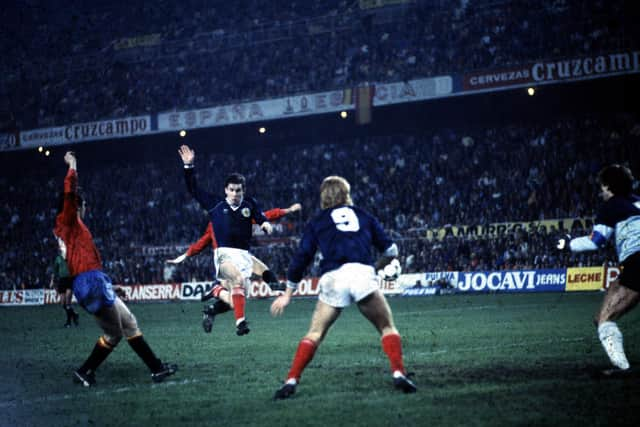

“I played in trials for Scotland schoolboys, after one of the trial matches – out Musselburgh way, I think – I was asked if I would like to go down to Manchester United for a week. That was the Easter holidays, ’72.
"Once United showed interest, some other teams started showing interest. I did not realise how big the club were – obviously I knew who they were and had seen them on TV, but it is not until you come down here that you realise.
"After the week they said we want to travel back and talk to your parents. And that was it really. I came back down and started in July as an apprentice.”
Going straight from a Scottish school to Manchester United was not as rare as it might seem now. Several did it, including Aberdonian John Fitzpatrick. He was Albiston’s first youth coach, having been forced to quit the game at the age of just 26, before Paddy Crerand – another Scot – replaced him. And then, when Tommy Docherty replaced Frank O’Farrell as manager, Old Trafford really did become Scottish central.
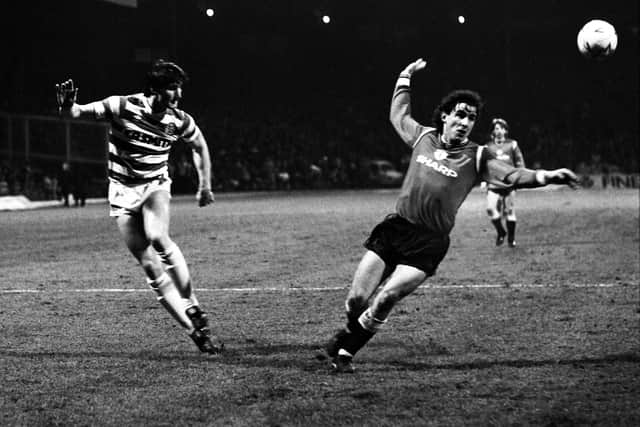

Advertisement
Hide AdAdvertisement
Hide AdWhen Albiston made his debut, in a League Cup victory over Manchester City in 1974, seven Scots featured for the home team, including Alex Forsyth, Jim Holton, Jim McCalliog and Lou Macari, who came on as sub. “When Lou made his debut, I think there were eight Scots in the team!” notes Albiston.
“Tommy was what you saw, a whirlwind really. He more or less said it is not about the opposition, it is about how we want to play. He really concentrated on building everyone’s confidence up.”
Albiston’s breakthrough season was under Docherty, who died on Hogmanay, in 1976/77. After Houston – yes, another Scot – broke his ankle three weeks earlier, he was handed an FA Cup final place v Liverpool. “It was the first FA Cup tie I’d played!” stresses Albiston. “I felt slightly uncomfortable. Stewart had played a big part in us getting to the cup final after scoring v Aston Villa in a sixth-round game when we went behind 1-0 at home and managed to win 2-1.” Albiston’s uneasiness was intensified by the tone of a headline in the Manchester Evening News: “I’ll get Stewart a medal!” He could not relate to the easy confidence relayed.
In a mark of the (young) man, Albiston offered his more senior team-mate his winners' medal. Houston unsurprisingly refused, perhaps reasoning, wrongly, that his compatriot may never win another one. In fact, Albiston was to earn two more, becoming the first United player to lift three FA Cups. In total, he played 485 times for United (he was only knocked out of top ten list of appearance-makers five years ago by Wayne Rooney).
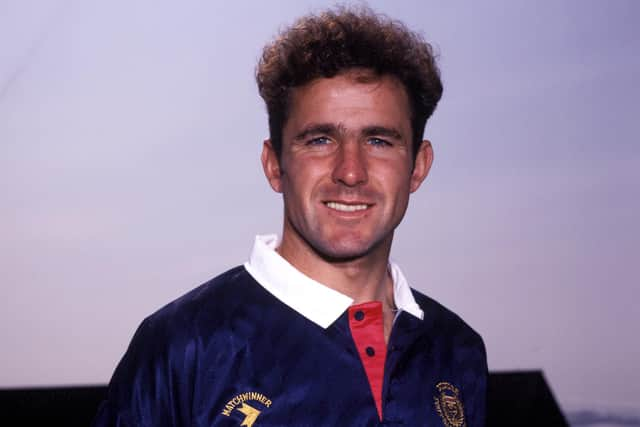

If that’s not enough of a legacy, he also had a small part to play in current manager Ole Gunnar Solskjaer's arrival at Old Trafford as a player.
Looking for Sir Alex’s number
Albiston played for Norwegian side Molde in two different spells later in his career, the club where Solskjaer later made his name. Years later, with the striker having attracted interest from all across Europe, Albiston was surprised to receive a call from Norway. “The secretary contacted me because they had received an offer for Ole – a lot of clubs were showing interest in a lot of their players at the time.
"They had an offer come through for Ole from someone else. Jimmy Ryan, one of the Manchester United coaches, had been over a few times to watch Ole so the secretary contacted me because they wanted to speak to someone at the club. It was the weekend and they could not get hold of anyone. They wanted someone with Sir Alex’s number…”
A few weeks later, Solskjaer joined to fulfil his destiny of not only scoring a European Cup winner for the Old Trafford club, but also, in a development that’s not been without hiccup, becoming one of Ferguson’s successors in the managerial seat. Despite the brickbats, this week his side succeeded in knocking Liverpool off their perch, albeit it is only midway through the season. It means their meeting tomorrow afternoon is particularly eagerly awaited.
Advertisement
Hide AdAdvertisement
Hide Ad“Liverpool v Manchester United is always the fixture both sets of players looked out for in June, when the fixtures were published,” says Albiston. “Everyone looks at that game, the two most dominant clubs in the last 40 years.”
Our cup runneth over in this respect – there’s another meeting between the sides a week tomorrow as well, when Manchester United host Liverpool in the fourth round of the FA Cup.
“The two cities are only thirty miles apart,” continues Albiston. “It’s the biggest game of the season for both sets of supporters no matter how the opposition are doing – you always looked forward to that game. Forty years ago, they (Liverpool) were dominating, then United had a spell obviously. Chelsea have come, and Arsenal have come but Liverpool v Manchester United is a fixture the whole nation looks forward to, not just Manchester United and Liverpool fans.”
*****
Like now, Scotland had some fine options at left-back in the 1970s and 80s, with Albiston perhaps suffering from the emergence of Maurice Malpas after being initially tasked with displacing Frank Gray. Of the 14 caps he earned, two were against Uruguay, the latter one, his last Scotland appearance, coming at the World Cup finals in 1986.
He came in for Malpas, who had played the first games, with Steve Nicol pushed into left midfield – with the best chance of the game landing at the right foot of the the Liverpool player. “As I’ve already told you, I didn’t get many goals – I would have blazed it over the bar,” says Albiston, happy for the chance to have fallen for his full-back chum.
Scotland tumbled out of the tournament after the 0-0 draw with Albiston picking up a niggling groin strain for his troubles. It led to a hernia operation shortly after being reacquainted with Ferguson at Old Trafford. His new manager was keen to respect Albiston’s reputation, picking him several times when fit, but wholesale change was on the horizon – Gordon Strachan later put United’s failure to win the title under Ron Atkinson down to the team being too small. He wrote in a newspaper that it was like “Big Ron and the Seven Dwarfs – men like Arthur Albiston, Remi Moses, Jesper Olsen, Mike Duxbury – and myself!”
From The Hawthorns to Dens Park
Albiston followed Atkinson to West Brom, where he played regularly for a season. “Brian Talbot came in after Ron left to go to Spain, and he decided to let me go … which is how I ended up at Dundee.”
In direct contrast to his Manchester United career, Albiston’s Dundee years – and yes, there were two, the second of which was spent either playing for the reserves or not at all – will not go down in the annals.
Advertisement
Hide AdAdvertisement
Hide Ad“People down here thought I had passed away and or had gone to Australia!” says Albiston, such was his suddenly low profile. He had based his family in Perth, just the Perth-on-Tay version. He sought to throw himself into his first experience of the Scottish domestic scene at the age of 33.
He made ten first-team appearances for Dundee. His league debut saw him come up against a familiar face in Jimmy Nicholl – a pair of former United full-backs whose association dated back to the same Old Trafford youth team in the early 1970s contesting a Premier League opener at East End Park, of all places. “Jimmy made his debut for Dunfermline the same day – and was sent off!” recalls Albiston, whose signing, in the same summer as Billy Dodds, entitled Dundee fans to feel a measure of excitement.
Nasty injury, George Burley and a return to England
There were some early high-points – a 4-3 win over Dundee United, courtesy of a hat-trick from Keith Wright after being 2-0 down, a 2-2 draw at Ibrox. Then Albiston suffered a horror injury in a reserve game at Dens. “I got two broken ribs and one of them punctured my lung so I was not able to play again until February/March, but by that time the team had gone on a bad run.” With relegation becoming inevitable, Gordon Wallace needed to think about an upcoming First Division campaign.
“He wanted to cut his losses and get rid of about six or seven players – I was one of them.” But Albiston couldn’t get fixed up with another club and spent a further frustrating season at Dundee, with his two sons, Ross and Ryan, having been enrolled at school in Perth. “They were there for nine months and then we came back down here again,” he says.
That was it for him in terms of Scottish league experience bar one 90 minutes for Ayr United. “George Burley was the manager and a good friend of mine,” he recalls. “It was over the Christmas-New Year period. Three or four games were called off. I only played once in the end (v Falkirk, in December 1993) – we got beat 3-0. George never held it against me – we still speak!”
A career that had been the definition of stable became a slightly peripatetic one, although over 60 games for Chester City, saw him settled again, with a fleeting experience of management at non-league Droylsden to follow afterwards. He now covers academy matches for MUTV and works as a pundit.
That Antti Niemi phonecall
Albiston retained enough Scottish football knowledge to be asked to host a short-lived Scottish football phone-in on Talksport in the early 2000s, which might well have gone largely unremembered by everyone had it not been for a caller wondering why former Hearts goalkeeper Antti Niemi, then starring for Southampton, was not in Craig Brown’s Scotland squad. Yes, Albiston was the seeming patsy on the other end of the line left trying to make sense of this suggestion in a clip that just about retains its charm despite too-many airings since. “It gets brought up a few times,” says Albiston, slightly wearily.
“Someone only brought it up again a few weeks ago. I thought the person was taking the mickey, I was trying to decipher whose accent it was – is this someone I know, one of my friends from north of the Border?'
Advertisement
Hide AdAdvertisement
Hide Ad"Thus guy, obviously a Hearts supporter, phoned up to wonder why Antti Niemi was not in the Scotland squad, and it threw me a little bit … he was being deadly serious. I thought, hang on a minute, he’s Finnish. And the guy bounced back and said: ‘no, he’s not finished, he’s only 28!’”
“I was on the back-foot a bit, but managed to keep my composure,” he adds, still clearly not quite sure what to make of his role in an enduring classic, which, every May 31, Niemi’s birthday, washes up again on Twitter, as well as on many days in-between.
After nearly 500 matches for Man United, Albiston is entitled to express some wry amusement at this turn of events.